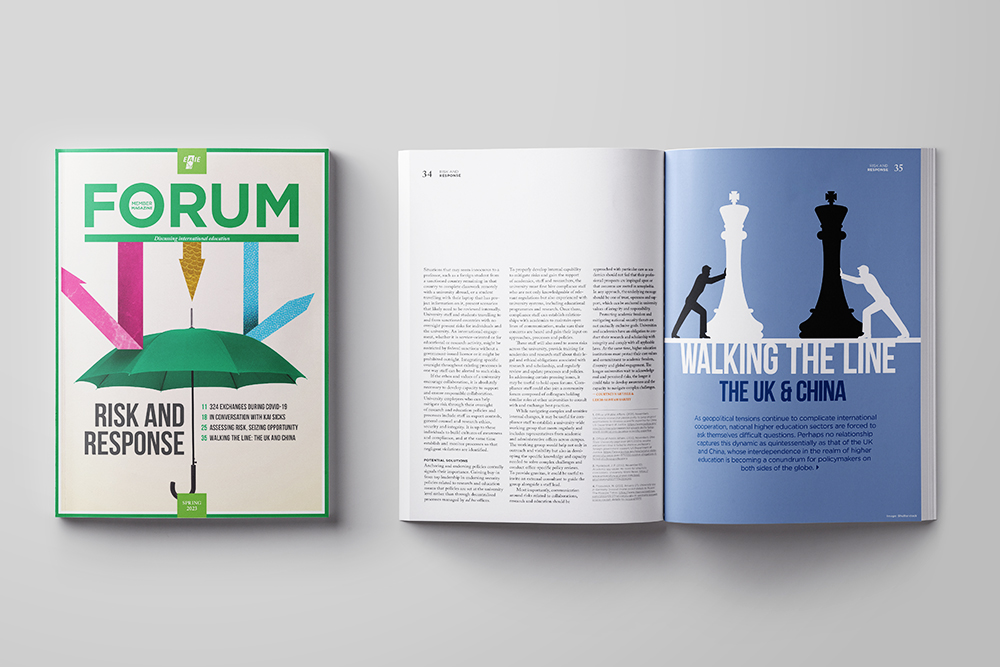Walking the line: the UK and China

Today’s blog post is a sneak peak at the 2023 Spring Forum: Risk and response on the theme of ‘Risk and response’. This article, which takes a careful look at the nuanced relationship between the UK and China in the higher education sphere, is one of many thought-provoking articles featured in this edition.
Being a globally-engaged institution requires astute navigation on a choppy and unpredictable ocean, buffeted by geopolitical tensions beyond our control.
University-to-university relationships have been affected by recent friction between the West and both Russia and China. The mission of higher education and the underpinning ethos of internationalisation support an approach where the pursuit of knowledge and the fostering of relationships across borders normally transcend any political disagreements. Most of the time, universities argue that it is essential to maintain academic relationships. Academic boycotts are enacted only in exceptional circumstances. This can put universities at odds with more isolationist government positions and – in some cases – public opinion.
Full disengagement would come at a very high cost – not just for individuals or institutions, but for society more broadly
There are many potential areas of tension between institutions operating in different cultural contexts: divergent values; freedom of speech; national security; intellectual property; commercial sensitivity; unequal power relationships. However, the benefits of engagement and partnership (whether this takes the form of research or teaching collaboration, transnational education, recruitment or exchange of staff and students) can be immense for both parties. Full disengagement would come at a very high cost – not just for individuals or institutions, but for society more broadly.
UK reliance on China
Over the past decade, international student recruitment to the UK has become increasingly reliant on demand from China. Two significant policy factors contributed to that reliance. First, the ‘golden era’ fostered warm Sino-British relations under UK prime minister David Cameron (2010–2016). Second, the 2012 discontinuation of post-study work visas for international students discouraged student demand from price-sensitive countries like India, Pakistan, Bangladesh and Nigeria.
This was further exacerbated when all education providers were required to apply for ‘highly trusted sponsor’ status. If 20% or more of the students they offered places to were refused visas, institutions would lose or would not be granted ‘highly trusted’ status. This threshold was lowered to 10% in 2014. Double-digit visa refusal rates for many countries in Central and South Asia and Sub-Saharan Africa disincentivised student recruitment. An unintended consequence of this policy was, therefore, a shift in student recruitment towards countries with very low visa refusal rates, such as China and others in East Asia. Universities intensified their recruitment efforts in ‘low-risk’ countries for student visas, to make up for their losses from India, Pakistan and Nigeria.
When a post-study work route was reintroduced almost a decade later, in July 2021, much of the UK higher education system had embedded student demand from China through UK transnational education degrees and other locally-delivered courses recognised by UK higher education institutions. The UK also had a high reliance on high-calibre PhD students – either through partnership arrangements with university partners in China or funded, typically by the highly selective China Scholarship Council. Analysis shows that self-funded PhDs from China accounted for 68% of the overall growth in non-UK self-funded entrants to UK doctoral programmes over the period 2017–18 to 2020–21.
About 11% of the UK research output in 2019 was published with co-authors from China
The high proportion of doctoral researchers from China is the most likely explanation for the increasing proportions of academic staff with Chinese nationality – which is most pronounced in science, technology, engineering and maths (STEM) subject areas. China has become one of the UK’s top research partners: about 11% of the UK research output in 2019 was published with co-authors from China. In niche STEM areas like telecommunications and materials science, collaborations with China account for more than 30% of the UK’s research output.
A challenging context
Despite the many benefits of this close relationship, the mutual dependency that has developed between UK and Chinese higher education is increasingly perceived as a risk. The political climate is hawkish on both sides, to the extent that Vivienne Stern, chief executive of Universities UK, urged UK universities in July 2022 to "scenario-plan for a catastrophe in relations with China", while pushing back against "a mindset that resists international engagement".
Meanwhile, the UK government used new national security legislation to block a technology transfer sale by the University of Manchester to a Chinese company, with former universities minister Jo Johnson warning that "our universities need to prepare for a geopolitical shock that sees a security grid come down on many more of their activities, including knowledge partnerships with China".
Beyond this, there has been scrutiny of Confucius Institutes, with suggestions that Prime Minister Rishi Sunak is looking to close the 30 or so located in the UK, considering them "a threat to civil liberties in many universities".
A balanced response
Against this background, UK universities are striving to find a balanced response that supports international engagement while respecting the tensions that exist and operating within a fluctuating policy context.
It is neither possible nor, in most cases, desirable simply to cut off partnerships that have been carefully nurtured over many years
While most institutions have been trying for some time to diversify their student recruitment beyond China, it is neither possible nor, in most cases, desirable simply to cut off partnerships that have been carefully nurtured over many years. The growing power and reach of China’s own international higher education and research also needs to be acknowledged. China accounts for a fifth of the world’s tertiary learners. To use a colloquialism, there is a risk of ‘cutting off our nose to spite our face’.
A nuanced response to some of the challenges can be found in the 2021 report The China Question, which argues for the importance of improving the UK’s China (and Asia) literacy. It is noted that the UK’s dwindling capacity in the area of Chinese studies and language is a major point of vulnerability. Despite an almost 50-fold growth in the number of Chinese students in the UK since 1998, a report from the Higher Education Policy Institute shows that, over the same period, the number of students studying Chinese studies has not increased.
We need to find a formula that combines pragmatism and realism with our internationalist ideals
A lack of such understanding is a major risk. It means that students are increasingly caught up in a geopolitical tussle that may have little relevance to their circumstances. More seriously, the UK may inadvertently throw away the huge rewards that engagement with international students brings.
This takes us full circle to the shared mission of maintaining curiosity about one another to boost mutual understanding and facilitate the pursuit of knowledge across borders. Those of us working in international education need to find a formula that combines pragmatism and realism with our internationalist ideals.






